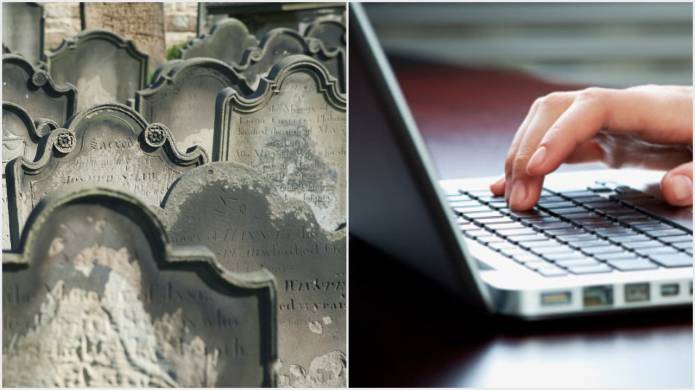YEOVIL NEWS: Recording Yeovil’s past for the future

A UNIQUE job could be about to come on the market to record onto computer the very core of Yeovil’s history – 25,000 local burial records.
Local authorities have a legal obligation to maintain burial records for interments within their cemeteries.
These records are held in various original bound registers and contain information such as the burial number, the name of the deceased, address, date or burial, age, purchaser, feeds paid, grave or vault number, depth of grave and other particulars.
The registers for Yeovil Cemetery in Preston Road are kept in a safe in a records room at the Yeovil Crematorium office.
Paul Rayson, general manager of Yeovil Crematorium, speaking in a report, said: “The records date from 1861 until the present day and contain burial registers, purchase grave registers, registers of graves and are indexed.
“The records are currently held in a number of heavy and bound registers – these are awkward to handle and difficult to reference.
“Staff time is taken researching these volumes when typing information into a keyboard can be so much easier, quicker and efficient.
“Unfortunately there appear to be periods during the cemetery’s operations where these records have not been entered fully into all of the registers.”
PHOTO - RIGHT: The entrance to Yeovil Cemetery in Preston Road, Yeovil.
Members of the Yeovil Crematorium and Cemetery Committee will be meeting on Wednesday (January 18, 2017) where they will be told that only a handful of burial records are held on the crematorium administration system databases.
“It would, however, be far more efficient for staff, the funeral trade and eventually the public to have all of these interments held on the computer system,” said Mr Rayson.
“The computer database provides for quick research, a back-up facility and organises the records instantly into a meaningful order.
“Once completed there will be future benefits available such as the opportunity for the public to research records online.”
Mr Rayson has proposed that a data input officer is taken on with the sole purpose of entering these records onto a database and provide the service, funeral trade and the bereaved with a better form of reference.
“There are over 25,000 interment records to be submitted,” he said. “The entering of all the interment records onto the system is estimated at a year’s work for one fully dedicated data input officer.”
The job could come with a salary of just under £20,000 which would come from the cemetery reserve fund.
Tags:
News.
Recent Posts
 YEOVIL NEWS: Police appeal for witnesses after man threatened and forced into a vehicle
YEOVIL NEWS: Police appeal for witnesses after man threatened and forced into a vehicle YEOVIL NEWS: Alan’s poetry goes into print – at the age of 86
YEOVIL NEWS: Alan’s poetry goes into print – at the age of 86 YEOVIL NEWS: Police reassure public after armed officers arrest man in Yeovil
YEOVIL NEWS: Police reassure public after armed officers arrest man in Yeovil YEOVIL NEWS: Yeovil Celebrates free event planned to take place again in 2024
YEOVIL NEWS: Yeovil Celebrates free event planned to take place again in 2024 YEOVIL NEWS: Wonderful Wiek’s still going strong at 80 and 60 years as Dale Fender
YEOVIL NEWS: Wonderful Wiek’s still going strong at 80 and 60 years as Dale Fender YEOVIL NEWS: Breast cancer unit appeal hits £2.4m – thanks to ladies that lunch!
YEOVIL NEWS: Breast cancer unit appeal hits £2.4m – thanks to ladies that lunch! YEOVIL NEWS: Vicar says he hopes defibrillator never has to be used for an emergency
YEOVIL NEWS: Vicar says he hopes defibrillator never has to be used for an emergency YEOVIL NEWS: Growing Pains brought dance alive and left me transfixed by its creativity
YEOVIL NEWS: Growing Pains brought dance alive and left me transfixed by its creativity YEOVIL NEWS: A good teacher is like a candle and Ken Davy illuminated the classroom
YEOVIL NEWS: A good teacher is like a candle and Ken Davy illuminated the classroom YEOVIL AREA NEWS: Chinnock Hollow to remain closed to traffic after £2.7million repair price tag
YEOVIL AREA NEWS: Chinnock Hollow to remain closed to traffic after £2.7million repair price tag YEOVIL AREA NEWS: Man exposes himself at Ham Hill
YEOVIL AREA NEWS: Man exposes himself at Ham Hill YEOVIL NEWS: The panto is such good fun we had to go and watch for a second time!
YEOVIL NEWS: The panto is such good fun we had to go and watch for a second time! YEOVIL NEWS: Evolution never fails to disappoint with panto magic at the Octagon
YEOVIL NEWS: Evolution never fails to disappoint with panto magic at the Octagon RIP QUEEN ELIZABETH II: Public invited to lay floral tributes at St John’s churchyard in Yeovil
RIP QUEEN ELIZABETH II: Public invited to lay floral tributes at St John’s churchyard in Yeovil RIP Queen Elizabeth II – who served the UK and Commonwealth with such distinction
RIP Queen Elizabeth II – who served the UK and Commonwealth with such distinction

















